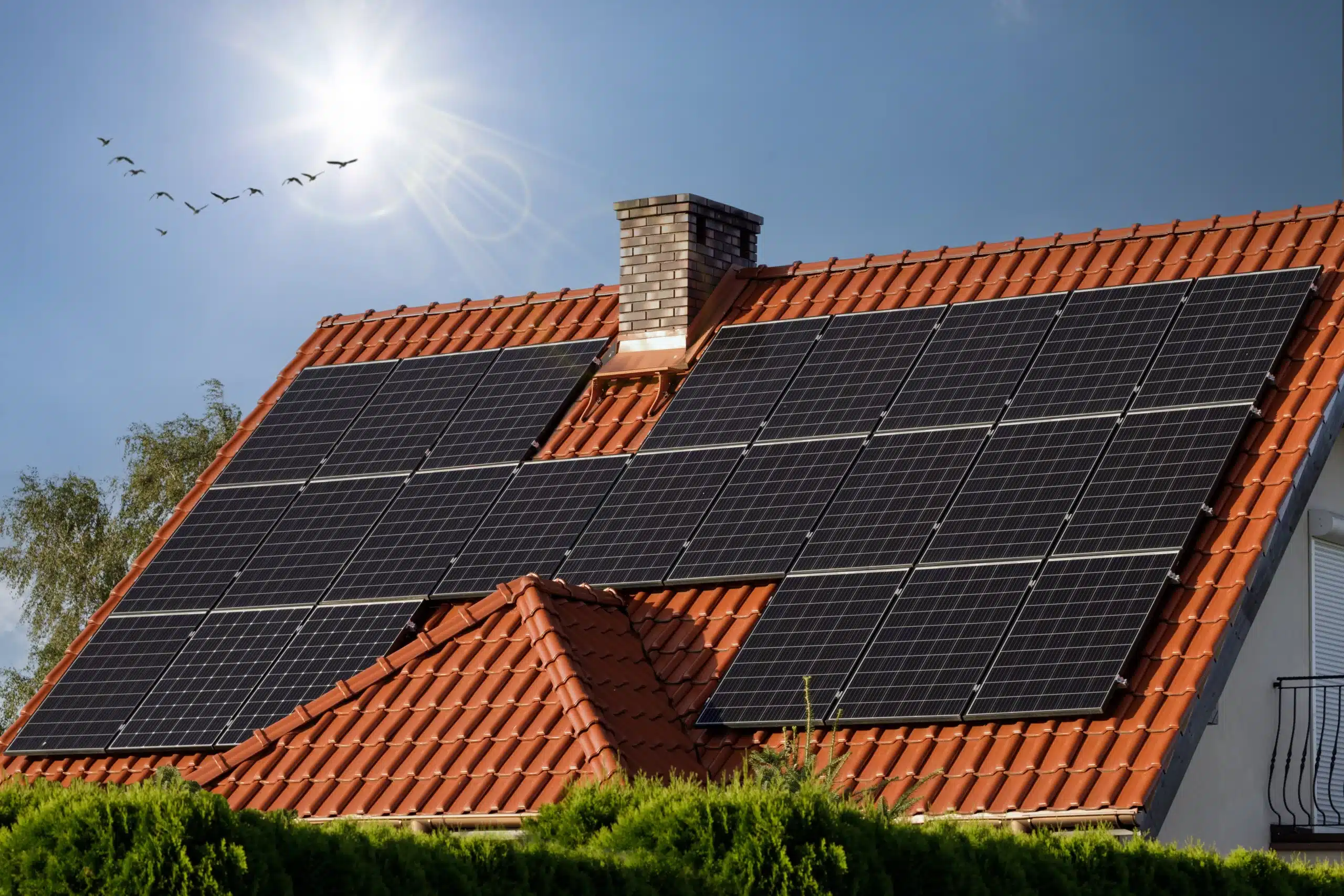
- Energy Rules and Regulations for UK Developers
- Why New Build Homes Lead to More Savings
- The Role of EPC Rating for New Builds
- What is an EPC Rating?
- How Do You Get an EPC Rating?
- Benefits of Investing in New Build Homes
- Challenges and Considerations
- Can Old Homes Be Energy Efficient?
- In conclusion
- FAQs
Given the growing concerns about climate change in the modern world and rising energy costs, homeowners now care more about energy efficiency in housing. People looking to buy homes are wondering, “Are new build properties more energy efficient than older ones?” Let’s find out!
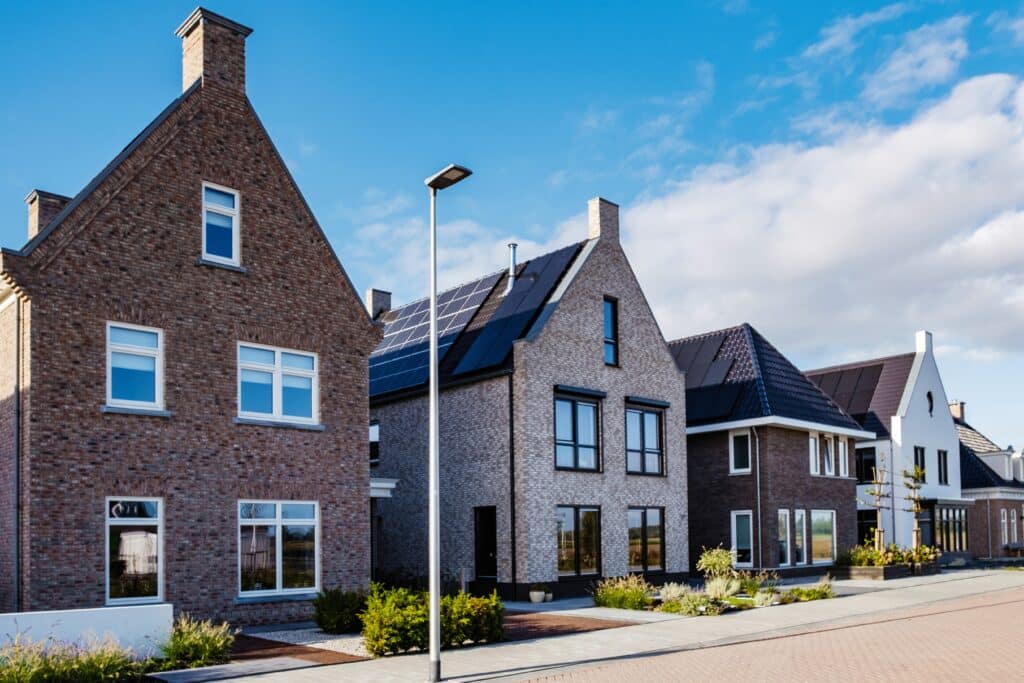
Older buildings weren’t really built to be energy efficient. They often had little to no insulation and single glazed windows, which caused a lot of heat loss.
As people became more aware of the environment, but energy prices kept going up, it became clear that we needed homes that use energy more efficiently.
Because of this, building regulations have changed over time, focusing more on saving energy. Developers and housebuilders have caught on and now design more energy efficient homes to meet modern needs and environmental goals.
📖 Related Reading:
Energy Rules and Regulations for UK Developers
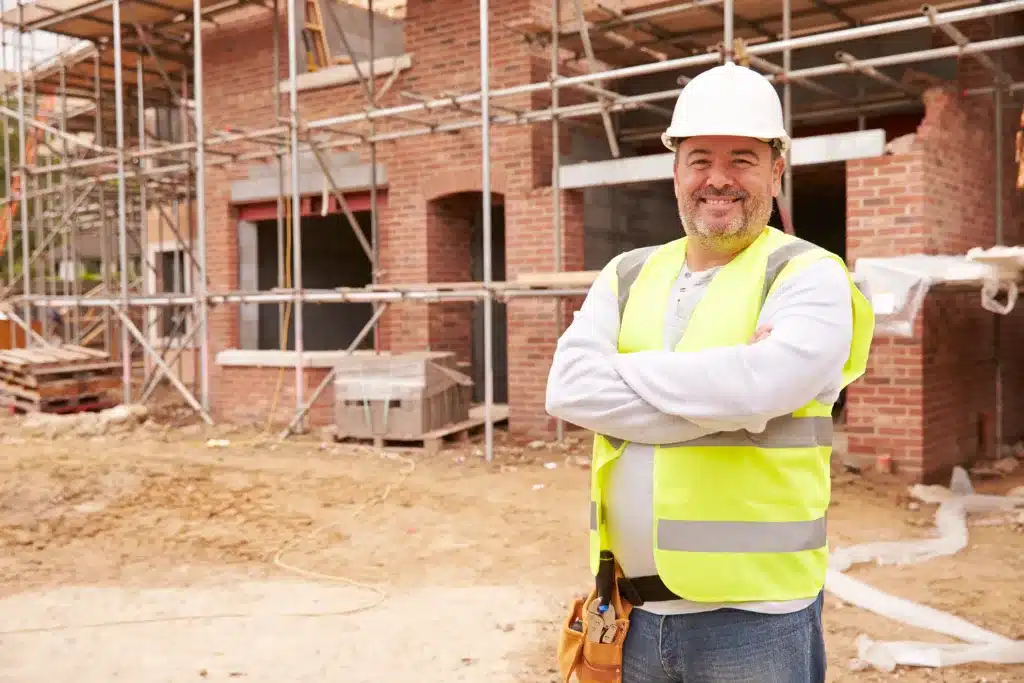
The UK government put in place strict rules to make sure that new homes use energy more efficiently. These rules are found in the Building Regulations Part L (Conservation of fuel and power), which were last updated in 2023—as of the date this article is published.
Developers and housebuilders have to comply with these regulations, and Building Control Bodies, like local authorities or approved inspectors, make sure they’re on track at different construction stages.
Some important parts of these rules include:
- Ensuring the energy efficiency of a building’s structure, like walls, roof, and floor, is top-notch with good insulation and tight sealing to keep the heat in.
- Setting a cap on how much CO2 a new house can emit, based on its size, shape, and type.
- Prioritising the use of solar panels and heat pumps to power homes and
- meet their energy needs efficiently.
- Making sure new homes have energy efficient heating and are built to high energy efficiency standards to be prepared for the future.
Why New Build Homes Lead to More Savings
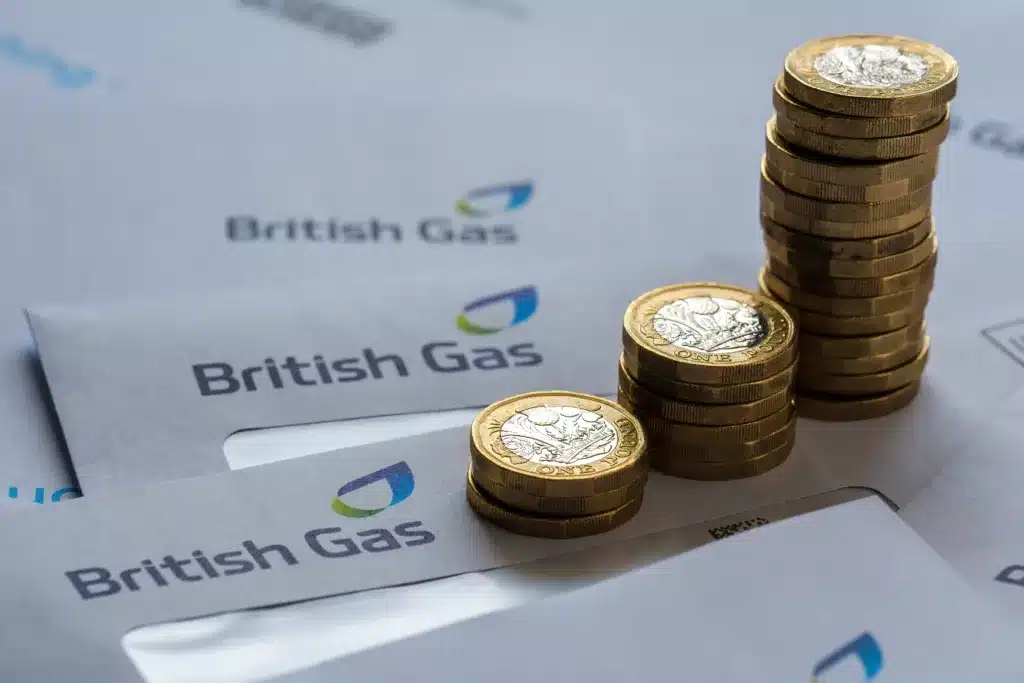
As a result of the government rules and regulations, new build homes are being built to be energy efficient from the get-go. This means builders pay attention to things like:
- Choice of building materials and techniques
- Thermally efficient insulation like cavity wall insulation
- High-quality windows and doors, such as those with double or triple glazing
- Efficient heating systems such as air source heat pumps,
- A+ rated energy and water saving appliances.
All this works together to keep your home warm. Since these homes are built to use less energy, you will have lower energy bills.
Plus, new builds come with A+ rated appliances that significantly reduce the energy consumption of dishwashers, washing machines, and other appliances.
Even though the starting price of a new build may be higher, the money you save on energy bills in the long run can be substantial. In certain areas, the UK government also supports this shift by offering perks or tax breaks to energy-efficient homes, which make them even more attractive to buyers.
The Home Builders Federation (HBF) reckons that new build properties use way less energy than older ones. On average, a new home uses about 100 kWh per m2 per year, while older properties need about 259 kWh per m2.
New builds (houses and flats) save an average of just over £2,000 per property each year, with the average annual running costs for a new build being £1,500, compared to an average of £3,570 for older properties. If we only consider new and old houses, the savings increase to £2,600 a year.
| Type of new build | Average monthly saving of a new build | Average annual saving of a new build |
| House | £183 | £2,195 |
| Flat | £71 | £850 |
| Maisonette | £120 | £1,440 |
| Bungalow | £124 | £1,480 |
The Role of EPC Rating for New Builds
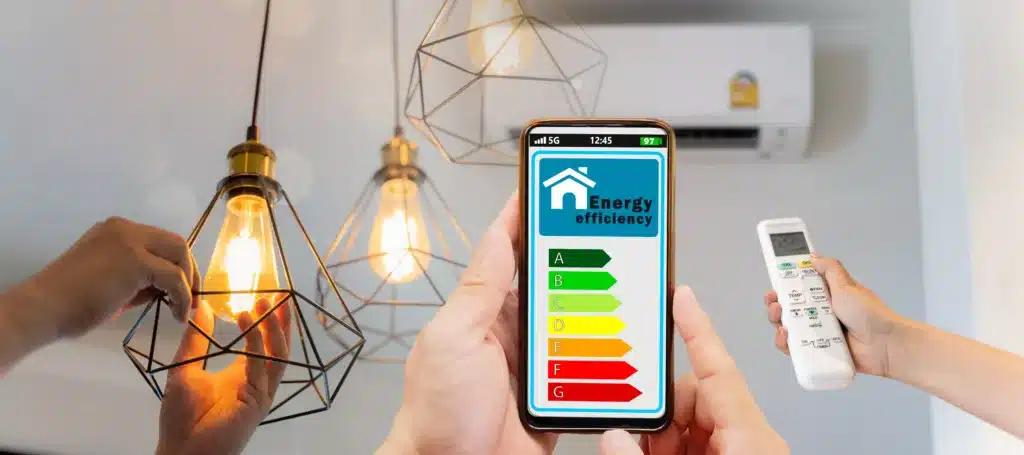
Data from the UK government tells us that most new homes (84%) have an energy performance certificate (EPC) rating of B or higher, but less than 4% of older homes have the same rating.
For instance, homes built after 2011 usually fall into EPC band B, while those built before 1930 are typically in band E. This means that new builds are far more likely to reach the top A or B energy efficiency ratings, making them both better for the environment and cost-effective in the long run. Even though there’s no minimum EPC rating for new homes right now, it will be raised from E to C in 2025 under the Future Home Standards.
But what is an EPC?
What is an EPC Rating?
An Energy Performance Certificate (EPC) is like a report card for your house’s energy use that scores it from A (top marks) to G (there’s room for improvement). This rating is calculated by looking at how well a building is insulated, the materials used to build it, and how efficient its heating systems are. It shows us how energy efficient a building is and gives an idea of how much it will cost to heat or cool it.
How Do You Get an EPC Rating?
A certified energy assessor pops around to check out the property’s energy features and then feeds the information into government-approved software to come up with an EPC rating. The score ranges from 1 to 100, and homes get put into EPC bands from A to G. The EPC report also offers ways to make your home more energy efficient, like switching to energy-saving light bulbs. This rating system is handy if you want to live more eco-friendly and keep your energy bills down. Plus, once you’ve got your EPC, it’s valid for 10 years.
Even if you’re renting, keeping an eye on EPC ratings is important.
If you want to find out more about getting an EPC, check out our dedicated article.
📖 Related Reading:
Benefits of Investing in New Build Homes

Stricter building regulations, using more sustainable materials, and a better EPC rating generally mean better energy efficiency.
Here’s a quick rundown on why opting for a new build is a real win-win:
Lower energy bills
As mentioned multiple times so far, new builds need less energy to keep you warm in the winter and cool in the summer. This means you’ll likely see your energy bills drop, which is great for your bank balance as you can spend your savings on things you actually love.
Better air inside
New builds use eco-friendly materials and come with top-notch ventilation systems, so the air inside is cleaner and healthier. Expect less dust, fewer allergens, and a lower chance of mould. Essentially, it makes your house a fresher, nicer place to live.
Enhanced value and lower costs
Newly built homes tend to increase in value more quickly than older ones. A home with an A EPC rating could sell for up to £40,000 more than one with a G rating. Choosing a new build might also mean spending less on home insurance and requiring fewer expensive upgrades to comply with new building regulations.
Kinder to the environment
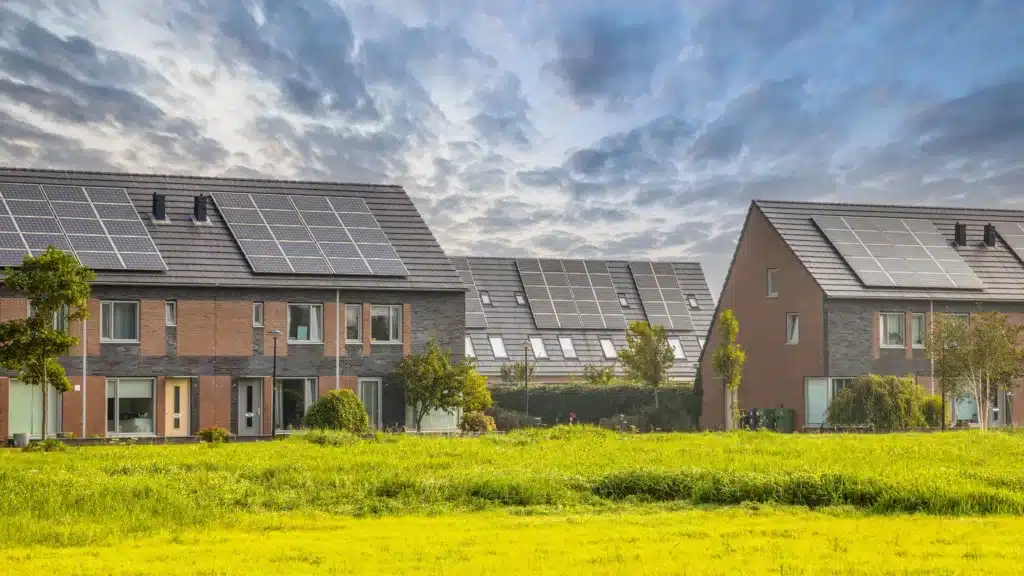
With features like solar panels and efficient energy use, new builds help reduce our impact on the environment. Lower carbon emissions mean you’re doing your bit to fight climate change, all from the comfort of your living room.
More comfortable living
New builds are usually designed to maintain a comfortable temperature all year round, so you won’t have to blast the heating or air conditioning. Plus, they’re often built to keep out unwanted noise so that you can enjoy a peaceful space.
Challenges and Considerations
When thinking about buying a new build, it’s important to weigh the upfront costs against the long-term savings. Finding eco-friendly new builds on the real estate market can be challenging. Pay close attention to all the details and make sure you understand what makes a property truly green.
Can Old Homes Be Energy Efficient?
Yes! While classic old homes will never be as energy efficient as a passive house or a zero carbon home, there are loads of ways to update an old home to be more energy efficient, lower energy bills, and do your part for the environment.
Insulating walls, floors, and lofts, swapping out old windows with double or secondary glazing, and putting in modern heating systems are great ways to cut energy use and costs.
Also, think about using renewable energy sources like solar panels to really up your home’s sustainability game.
In conclusion
It’s pretty clear that new builds are leading the way in sustainable living. In the UK, these homes meet and exceed current energy efficiency standards due to strict building regulations and the use of eco-friendly materials and technologies. This makes them a great choice for anyone looking to buy an environmentally friendly and cost-effective home.
As we look towards a greener future, new builds play a massive role in shaping a sustainable, energy efficient environment for houses. Whether you’re buying a home for the first time or want to live a more eco-friendly life, choosing a new build could be a great move forward.
FAQs
Are new builds more energy efficient than old homes?
Absolutely! New builds are designed to be much more energy efficient than older homes. They benefit from the latest building regulations that focus on energy conservation. With features like better insulation, double or triple-glazed windows, and more efficient heating systems, new builds keep the heat in and the cold out much more effectively than most older properties.
What are the benefits of buying an energy-efficient new build?
The perks of getting yourself an energy efficient new build are pretty great. You enjoy lower energy bills and get a home that’s better for the environment and equipped with the latest in-home technology. Plus, these homes are built to keep you comfortable all year round, regardless of the weather outside.
What incentives are available for buying an energy-efficient new build?
The UK government often offers a variety of incentives to encourage the purchase of energy-efficient homes. These can include tax breaks, lower stamp duties, or grants, particularly if you add renewable energy sources like solar panels. These incentives make going green with your new home even more attractive financially.
How do new builds help the environment?
New builds are way ahead when it comes to helping the environment. They use less energy thanks to their design and construction, which means fewer carbon emissions. Plus, many are equipped with renewable energy sources or ground-source heat pumps, reducing reliance on fossil fuels even further.
Do energy ratings affect the value of a new build?
Yes, energy ratings, shown through Energy Performance Certificates (EPCs), can really bump up the value of a new build. Homes with higher energy ratings (like A or B) are more appealing because they mean lower energy costs, more comfort, and they’re better for the planet. This can make them more valuable and attract more buyers, especially sustainability-minded ones.

